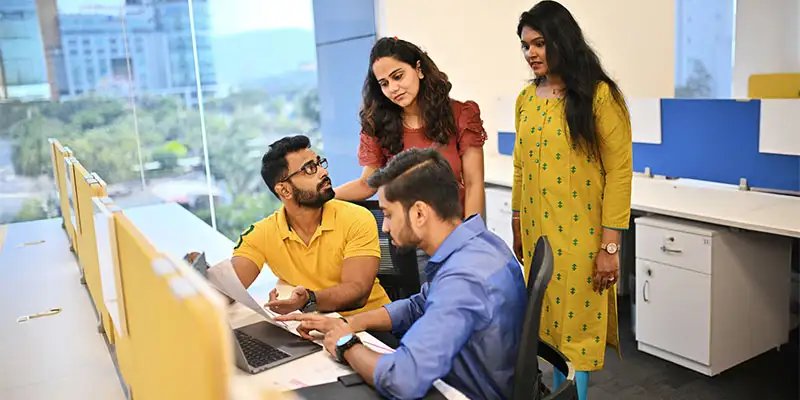Debasmita Dasgupta | Posted June 16, 2025 09:00 AM
The Public Policy departments in several IITs and IIMs are using AI driven technologies and data analytics to understand the demand of various sectors. The students are being trained to effectively use these technological tools to analyse the data collected from all walks of society to develop evidence-based, data-driven methods needed for smart and effective policymaking.
As data and digital technologies continue to reshape governance in India, leading academic institutions are stepping up to train the next generation of policymakers. Through immersive fieldwork, cutting-edge research, and tech-enabled learning, institutes such as IIT Kanpur, IIM Kozhikode, IIM Ahmedabad, and IIM Lucknow are preparing students to formulate stronger policy suggestion designed on evidence-based insights and real-world solutions.
Data as Catalyst
“Data and technology are pivotal in shaping public policies, particularly in urban planning, environmental management, and governance,” says Prof Manindra Agrawal, director, IIT Kanpur. Research at IITs is increasingly influencing national frameworks through collaborations with government agencies like DARPG, UIDAI, and NITI Aayog. Advanced analytics, simulation tools, and AI are central to this transformation.
“India’s public policy is increasingly driven by data and technology to enhance efficiency, transparency, and targeted delivery. From AI-powered fraud detection by IRCTC to digital platforms such as CoWIN, technology is transforming governance. In agriculture and administrative sectors, AI and data analytics support climate resilience, crime prediction, and resource optimisation. Institutions such as IIM Lucknow are equipping students and faculty with data literacy and hands-on experience through research, internships, and hackathons. Experts emphasise that evidence-based, data-driven methods are essential for smarter and more effective policymaking,” says Prof Kshitij Awasthi, chairperson, Centre for Public Policy, IIM Lucknow.
Real-world Impact
At IIM Kozhikode, the Immersive Leadership Discovery (ILD) course allows students to work directly with government bodies such as NITI Aayog, Kerala Rail Development Corporation, and Kochi Smart Mission. “Students are required to submit policy briefs based on extensive fieldwork, stakeholder consultations, and data analysis. These are not academic exercises—they often influence real policies,” says Sthanu R Nair, professor, Economics, IIM Kozhikode. Over the last five years, nearly 150 students have worked on field evaluations in sectors including rural tourism, coir industries, agriculture, and healthcare.
At IIM Ahmedabad, students engage in live policy challenges through capstone projects, independent study modules, and active policy clubs. “We have seen better outcome in data-driven decision making —whether in the Aspirational Districts Programme or PM Ujjwala Yojana,” says Prof. Namrata Chindarkar, Chairperson, JSW School of Public Policy. “Our curriculum uses case-based pedagogy with real-world cases on Aadhaar, cash transfers, and energy access. This grounds students in the realities of rural development.”
At IIT Kanpur, AI and data science are core to public policy innovation. One notable initiative is the Intelligent Grievance Management System (IGMS)—originally developed for the Ministry of Defence, now used by ministries under the PMO for root-cause analysis of citizen grievances. “Our impact goes beyond the lab. We digitised over 5 lakh pages of handwritten anti-corruption records for the UP Police—this is digital governance in action,” says Prof Agrawal. Students also gain exposure to Python, R, Tableau, and Power BI, along with training in causal inference, machine learning, and impact evaluation. The Census Data Research Workstation provides access to digitised census microdata, allowing students to analyse demographic trends and social indicators first-hand.
Policy from Ground Up
To ensure policies can be applied in under-resourced contexts, IIT Kanpur emphasises fieldwork and participatory design. “The AMRIT project teaches students to deploy affordable air quality sensors in rural India. It is not just about tech, but context—how to apply innovation where infrastructure is weak,” says Prof Agrawal.
At IIM Kozhikode, students have undertaken policy studies on Wayanad tourism and Kerala’s e-Health mission, involving grassroots consultations and extensive field immersion.
“The government is increasingly using data and technology to improve the efficiency of welfare programmes,” says Prof Nair. Highlighting initiatives like PRAGATI, PM GatiShakti, and Aadhaar-enabled DBT, he says, “Just the DBT scheme alone has led to savings of around Rs 5 lakh crore.”
Practice-Oriented Training
Institutions are going beyond theoretical instruction. “We train students not just in policy theory but in application—through case studies, hackathons, and rural immersions,” says Prof Awasthi. He cites the MGNF programme, where students helped digitise district-level skilling ecosystems.
“These student-led initiatives supplement and even refine government policies. They provide fresh insights into crime mapping, Aadhaar-based DBT, and climate-resilient agriculture,” he adds.
IIM Ahmedabad continues to develop detailed case studies on the digital divide and transformation in sectors like agriculture, MSMEs, education, and health. “In our Executive Education programmes for government officials, we regularly feature sessions on data-driven decision-making and data visualisation,” says Prof Chindarkar.
Together, these institutions reflect a broader shift in public policy education—towards data-driven, interdisciplinary, and field-immersive approaches.
The latest news, articles, and resources, sent to your inbox weekly.
© Copyright 2025 Bennett Coleman & Co. Ltd. All rights reserved.
Powered By 8 SAS ONE | V4.19
